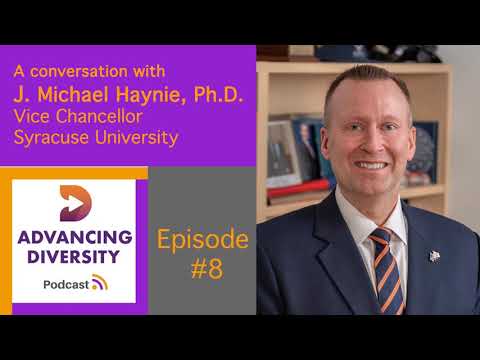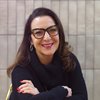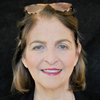Give Vets a Chance: Mike Haynie Advocates for the Inclusion of Veterans

After proudly serving in the United States Air Force for 14 years, J. Michael Haynie Ph.D., now champions more than 25,000 others in the military community annually. As vice chancellor, strategic initiatives and innovation, of the Institute for Veteran and Military Families (IVMF) at Syracuse University, Haynie leads by example, having successfully reentered society after his service through the path of entrepreneurial education.
Today, Haynie interrupts bias against veterans by piloting new ways of delivering education and economic opportunities to this vital and, at times, invisible community. His activism saves lives.
On January 8 at CES, MediaVillage will induct Haynie into the Advancing Diversity Hall of Honors, along with seven others who have moved from advocacy to activism. Each inductee has shared their story and inspiration in this podcast series.
In this conversation, Haynie speaks with Ginger Conlon, editor-in-chief, and E.B. Moss, head of content strategy for MediaVillage, about how, in contrast to some public perceptions, our military community is well-equipped to enter the workforce — they are trained to be entrepreneurial, diverse, and resilient. He encourages us all to get to know this generation of military veterans and to invest in their futures.
The following has been edited for clarity and length.Listen here to the full interview and please subscribe to and share all the Advancing Diversity Podcasts, available on Apple Podcasts, Stitcher, and YouTube.
Moss: You've made a difference in the lives of so many veterans and their families through the Institute for Veterans and Military Families (IVMF). Would you explain what IVMF does and how it came about?
Haynie: While serving, I was fortunate that the Air Force helped me to pursue a Ph.D. in Entrepreneurship and Innovation. I taught at the Air Force Academy for a few years and really fell in love with teaching and being around students, so decided to leave the Air Force in 2006 and come to Syracuse University as a professor.
That context is important because, what really struck me the more I became acclimated in civilian higher education, was the opportunity to leverage what higher education does well: to teach, train, inspire, and make a difference in the lives of the community that I came from.... That opportunity was the basis for proposing that Syracuse University create what is still today the nation's only interdisciplinary academic institute in higher education focused on the social-economic wellness concerns of veterans and their families.
Interestingly, Syracuse University as people know it today exists largely because of veterans. Until World War II, we were a regional university with an enrollment that never exceeded about 4,000 students — until it opened its doors to returning veterans and within two years had an enrollment of about 17,000 students.
What we're finding today is that one of the biggest challenges facing those leaving military service and entering civilian society is social and cultural isolation. They don't feel part of the community — the society that they went to war to defend — because they can't look to their left or their right, whether it's in a classroom or workplace, and really find people like them that have that same shared experience of military service, and it can be isolating.
So, a lot of what we're focused on is how to bridge that chasm between the small minority of Americans who have served in the military over the course of the last 15-plus years and the majority of Americans who have benefited from that service….
And I knew that post-9/11, about 30 percent of those who left the military had service-connected disabilities.... which was unprecedented. That insight motivated me to develop and launch our first IVMF program, the Entrepreneurship Bootcamp for Veterans With Disabilities, for those traumatically wounded by war. Universities from around the country reached out and asked to join us.
Conlon: How is the educational community embracing your approach to veterans?
Haynie: Veterans are, by definition, nontraditional students. They're older than our traditional student, they have years of unique work experience, they are much more likely to be married when they're pursuing a degree. Many of them, because of that, have to hold down a job while they're going to school. That's important because, across higher education as an industry, the nontraditional student is more and more becoming who we are serving.
[Studies indicate that] within the next five to seven years, almost 50 percent of all of those in the United States pursuing their first degree out of high school will be adult learners.... And many institutions are not set up to serve them at scale. Other universities are learning from us.
Moss: Jack Myers, our founder and a well-known alum of Syracuse University, was talking about how our industry embraces and supports nontraditional students and other nontraditional demographics.
Haynie: I learned from our Newhouse School of Communications here at Syracuse that the media industry has been disrupted ... in ways that no one could have predicted. The same is true of higher education. As we look to the future, we both need to embrace nontraditional stakeholders.
Moss: How and why should employers have a focused veteran and military-connected recruitment and retention strategy?
Haynie: The business case is compelling as so few in leadership [and society] understand the military service experience. One of the things that military service confers is an entrepreneurial mindset. I might be biased because I am a professor of entrepreneurship, but the classic definition of entrepreneurship is the pursuit of opportunity in the face of inherently constrained resources. That's one of the things that service members learn how to do. And whether it's in a work environment or an educational environment, the idea of being able to set goals, build a strategy to achieve those goals, and then take action, says something about what a veteran, a military family member, as well, could bring to the work environment.
Resilience is another dimension that the military fuels. Next, is diversity. The military is a highly diverse population on every metric. Veterans are adept at working across cultures. They will make your environment richer, more dynamic, more diverse, and, ultimately, better.
Conlon: What's your advice for hiring managers who are working to bring diverse candidates into their organization and talent development pipeline?
Haynie: Become culturally competent ... the majority of hiring managers don't know how to read a military resume, and many veterans are not culturally competent in translating military-learned skills and abilities into a traditional resume.
The other piece [of advice] is to create a community that provides veterans with a sense of understanding, value, and belonging. There's a troubling statistic: 50 percent of military members who take their first civilian job leave within a year. What's interesting is that they're not being fired, instead, they are leaving in pursuit of a better cultural fit.
Conlon: This group has an entrepreneurial mindset, resilience, diversity of background and thought, and, they value community. They sound like a great fit for the media, marketing, and advertising industry. Are you seeing interest from either side of the hiring equation?
Haynie: A good number of veterans are drawn to these industries. You could argue that there's a natural transition for those who worked in public relations, public affairs, and marketing while serving. There's also interest and an ability to become content creators and small business owners.
On the corporate side, CVS, Comcast, and Disney are doing good things around hiring and recruiting veterans and related service members.
Moss: What more can media do to support IVMF initiatives?
Haynie: I wish the news industry would report more on military issues, so Americans know the facts. Storytelling in media is problematic, as it contributes to some of the isolation that veterans feel. There are so many myths and destructive stereotypes about who this population is and who they are not.
It's very easy to tell a dramatic story about a veteran and ascribe mental health issues; we see this on some popular TV shows, where a veteran will be depicted as a character with PTSD and a host of related issues. That does a disservice to the community as it perpetuates negative, [imbalanced] stereotypes.
Moss: What makes you hopeful about the progress you've made?
Haynie: The potential of higher education, to change the trajectory of the social and economic lives of individuals who went from high school to national service, is profound. I certainly hope that every person with a title like mine will give veterans or [ members of a related community] the tools to thrive at their institution and within their community.
Weaving diversity and inclusion into the fabric of your company is good for business. And we have proof. In this podcast series, our Advancing Diversity Hall of Honors 2020 inductees each discuss the many ways their organizations champion diversity, equality, and inclusion, as well as examine the benefits to their company, constituents, and community. Each episode features one inductee's strategies and best practices that others can adapt to help their organizations accelerate the move from advocacy to activism.
The 2020 Advancing Diversity Hall of Honors inductees include Jill Baskin, chief marketing officer, The Hershey Company; J. Michael Haynie, Ph.D., vice chancellor for strategic initiatives and innovation, Institute for Veteran and Military Families at Syracuse University; Tim Jones, chief executive officer, Publicis Media, Americas; Tim McNeal, talent development, Walt Disney Television; Sue Obeidi, director, Muslim Public Affairs Council, The Hollywood Bureau; Tony Rogers, chief member officer, Sam's Club; Tiffany R. Warren, founder and president, ADCOLOR, and senior vice president, chief diversity officer, Omnicom; and Shelley Zalis, chief executive officer, The Female Quotient.
Click the social buttons to share this story with your friends and colleagues.
The opinions and points of view expressed in this content are exclusively the views of the author and/or subject(s) and do not necessarily represent the views of MediaVillage.com/MyersBizNet, Inc. management or associated writers.



